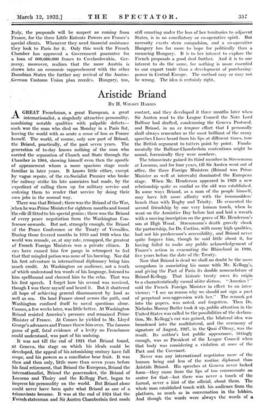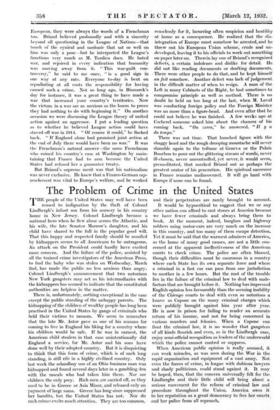Aristide Briand
By H. WILSON HARRIS
AGREAT Frenchman, a great European, a great internationalist, a singularly attractive personality, 'combining notable qualities with palpable defects- isuch wat the man who died on Monday in a Paris flat, leaving the world with as acute a sense of loss as France lierself. The world, of course, only saw part of Briand, the Briand, practically, of the past seven years. The generation of to-day knows nothing of the man who carried the separation of Church and State through the Chamber in 1904, showing himself even then the apostle of appeasement whom a more spacious stage made familiar in later years. It knows little either, except by vague repute, of the ex-Socialist Premier who broke the railway strike his late associates had made, by the expedient of calling them up for military service and ordering them to render that service by doing their own jobs in the normal way.
There was that Briand ; there was the Briand of the War, when he was Prime Minister for eighteen months and found Ithe role ill fitted to his special genius ; there was the Briand of every peace negotiation from the Washington Con- ference onwards. But not, strangely enough, the Briand of the Peace Conference or the Treaty of Versailles. During those fevered months in 1919 and 1920 when the world was remade, or, at any rate, remapped, the greatest of French Foreign Ministers was a private citizen. It can have caused him few pangs in retrospect to feel that that mingled potion was none of his brewing. Nor did his first adventure in international diplomacy bring him much credit. At Washington an audience, not a tenth of which understood ten words of his language, listened to him spellbound and cheered him to the echo. That was his first speech. I forget how his second was received, though I was there myself and heard it. But it shattered all hope of achieving general disarmament by land as well as sea. On land France stood across the path, and Washington confined itself to naval questions alone. Cannes, a few weeks later, was little better. At Washington Briand resisted America's pressure and remained Prime Minister of France. At Cannes he yielded to Mr. Lloyd George's advances and France threw him over. The famous game of golf, fatal evidence of a levity no Frenchman kould understand, was part of his undoing.
It was not till the end of 1924 that Briand found, fat Geneva, the stage on which his ideals could be developed, the appeal of his astonishing oratory have full scope, and his powers as a conciliator bear fruit. It was then and then only, little more than seven years before his final retirement, that Briand the European, Briand the internationalist, Briand the peacemaker, the Briand of Locarno and Thoiry and the Kellogg Pact, began to impress his personality on the world. But Briand alone could never have been quite what Briand as one of a triumvirate became. It was at the end of 1924 that the French statesman and Sir Austen Chamberlain first made contact, and they developed it three months later when Sir Austen read to the League Council the Note Lord Balfour had drafted, condemning the Geneva Protocol, and Briand, in an ex tempore effort that I personally shall always remember as the most brilliant of the many speeches I have heard from his lips at different times, tore the British argument to tatters point by point. Funda- mentally the Balfour-Chamberlain contentions might be sound, forensically they were nowhere.
The triumvirate gained its third member in Stresemann at Locarno, and for four years, till Sir Austen went out of office, the three Foreign Ministers (Briand was Prime Minister as well at intervals) dominated the European stage. When Mr. Henderson appeared in 1929 a new relationship quite as cordial as the old was established. In some ways Briand, as a man of the people himself, may have felt more affinity with the ironmoulders bench than with Rugby and Trinity. He cemented the second friendship by one very human touch, when he went on the Armistice Day before last and laid a wreath with a moving inscription on the grave of Mr. Henderson's son at High Wood. Stresemann's death gravely shook the partnership, for Dr. Curtius, with many high qualities, had not his predecessor's accessibility, and Briand never quite forgave him, though he said little about it, for having failed to make any public acknowledgement of France's action in evacuating the Rhineland in 1930, five years before the date of the Treaty.
Now that Briand is dead we shall no doubt be the more scrupulous in associating his name with Mr. Kellogg's, and giving the Pact of Paris its double nomenclature of Briand-Kellogg. That historic treaty owes its origin to a characteristically casual ()biter dictum. "America'! " said the French Foreign Minister in effect to an inter- viewer; "I see no reason why we should not sign a pact of perpetual non-aggression with her." The remark got into the papers, was noted, and forgotten. Then Dr. Nicholas Murray Butler took it up, public attention in the 'united States was called to the possibilities of thc declara- tion, Mr. Kellogg's ear was gained, the bilateral idea was broadened into the multilateral, and the ceremony of signature of August, 1927, in the Quai d'Orsay, was the result. Its author's last public appearance, fittingly enough, was as President of the League Council when that body was considering a violation at once of the Pact and the Covenant.
Never was any international negotiator more of the human being and less of the routine diplomat than Aristide Briand. His speeches at Geneva never lacked form—they came from the lips of too consummate an orator for that—but there was never a touch of the formal, never a hint of the official, about them. The whole man established touch with his audience from the platform, as much as in conversation in the lobbies. And though the words were always the words of a European, they were always the words_ of a Frenchman too. Briand believed profoundly and with a sincerity beyond all questioning in the League of Nations—that touch of the cynical and sardonic that sat so well on him was only a pose—but he interpreted the League's functions very much as M. Tardieu does. He hated war, and rejoiced in every indication that humanity was moving away from it. " This war-guilt con- troversy," he said to me once, " is a good sign in one way at any rate. Everyone to-day is bent on repudiating at all costs the responsibility for having caused such a crime. Not so long ago, in Bismarck's day for instance, it was a great thing to have made a war that increased your country's territories. Now the victors in a war are as anxious as the losers to prove they had nothing to do with beginning it." On another occasion we were discussing the League theory of united action against an aggressor. I put a leading question as to whether he believed League action could have staved off war in 1911. " Of course it could," he flashed back. " If England alone had promised joint action at the end of July there would haye been no war." It was the Frenchman's natural answer—the same Frenchman who ruined his country's case at Washington by main- taining that France had to arm because the United States had refuSed her a guarantee treaty.
But Briand's supreme merit was that his nationalism was never exclusive. He knew that a Franco-German rap, yrochement was vital to Europe's welfare, and he worked ceaselessly for it, incurring often suspicion and hostility at home as a consequence. He realized that the dis- integration of Europe must somehow be arrested, and he threw out his European Union scheme; crude and un- developed, leaving it to his officials to work out something on paper later on. Therein lay one of Briand's recognized defects, a certain indolence and dislike for detail. He did not like reading documents or drafting doeuments. - There were other people to do that, and he kept himself au fait somehow. Another defect was lack of judgement in the difficult matter of when to resign. A man of the Left in many Cabinets of the Right, he had sometimes tn compromise principle as well as method. There is no doubt he held on too long at the last, when M. Laval was conducting foreign policy and the Foreign Minister was no more than' a figure-head. And even after that he could not believe he was finished. A few week; ago at Cocherel someone asked him about the chances of his coming back. "On terra," he answered. "It y a the temps."
There was not time. That hunched figure with the shaggy head and the rough drooping moustache will never shamble again to the tribune at Geneva or the Palais Bourbon to pour out the glittering stream of wordi, never ill-chosen, never uncontrolled, yet never, it would seem, premeditated, that marked Briand out as perhaps the greatest orator of his generation. His spiritual successor in France remains Undiscovered. It will go hard with Europe if none can be found.



















































 Previous page
Previous page